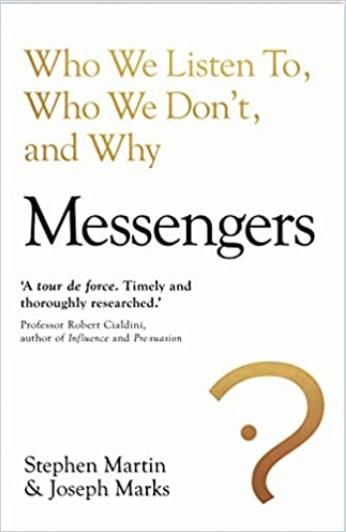Behavioral scientist Stephen Martin and researcher Joseph Marks draw insightful conclusions from in-depth research into how messengers influence your responses and the attention you pay to them.

The Medium Is the Messenger
Behavioral scientist Stephen Martin and researcher Joseph Marks synthesize an enormous volume of information on how messengers influence the messages you hear and the attention you pay to them. They present their material on the effects of hard and soft messengers, complete with compelling examples that explore decades of research. The authors’ understanding of messengers will help communicators and audiences decode the information age.
Perceived Status
Higher socioeconomic status – from fame, wealth or position – gives messengers greater credibility because people believe society rewards hard work. Audiences think people with high status have traits that contributed to their success and might be useful to their listeners.
Status is the relative standing someone has in a group, based on the degree of importance, attention and respect that is given to them by others.Stephen Martin and Joseph Marks
When a celebrity endorses a product, for example, audiences want to emulate the celebrity by buying the endorsed product or service. Intriguingly, aloofness also signals status.
Competence
Audiences grant credibility to perceived expertise, note Martin and Marks. A lab coat or stethoscope, for example, signals medical knowledge regardless of the wearer’s credentials or experience.
The central goal of the dominant messenger is to triumph over others.Stephen Martin and Joseph Marks
Facial cues signal competence or expertise. Humans regard defined cheekbones, sharp jawlines and mature-looking faces as signaling competence, which fuels credibility.
Confident messengers also project expertise. Audiences perceive that confident messengers believe their own messages. These speakers seem credible, regardless of their actual knowledge, skill or experience.
When an intermediary speaks of a messenger’s expertise, audiences tend to go along, even when they know the intermediary is an advocate for the messenger.
Dominance
Messengers express dominance by being competitive and assertive. People instinctively understand dominant and submissive roles. Posture and facial expressions can signal pride or superiority, and people react accordingly.
Dominant messengers display a willingness to make tough decisions to protect their group. Dominant personalities are known for selfishness, self-obsession and a low willingness to sacrifice for others. This appears in negotiations, when they will make fewer concessions. Hence, Martin and Marks reveal, when groups strive to cooperate, they find dominant leaders less valuable.
Attractiveness
Human instinct gives physical attractiveness a powerful messenger effect regardless of a person’s knowledge, skill or power. People perceive socially attractive messengers as ideal potential mates.
The beautiful are given preferential treatment and awarded higher status, and as a result, wield greater influence than the less attractive members of society.Stephen Martin and Joseph Marks
Employers are more likely to hire, promote and raise the salaries of attractive employees. Women benefit from attractiveness, but it can subject them to unwanted attention for precisely the reason attractiveness works as a messenger effect: mate value.
Warmth
Audiences perceive warm, approachable messengers as more credible than those with high status. Leaders who lack charisma can become more effective, advise Martin and Marks, by adopting a warm approach.
Each of us possesses a fundamental desire to form connections with others.Stephen Martin and Joseph Marks
Apologizing can create perceived warmth, even if the apology is for something over which the messenger has no control, such as the weather. Warmth signals concern for others in the group and that boosts a messenger’s impact.
Vulnerability
Showing vulnerability requires bravery and helps audiences feel a greater connection to the messenger.
Almost every facet of our lives is influenced not only by the content of messages sent, but also by the messengers delivering them.Stephen Martin and Joseph Marks
This personal connection can’t occur in a large group, Martin and Marks inform readers. Audiences identify with the story of a specific person who experiences difficulty more than they do with a group of people who face the same situation.
Compassion or guilt can connect you with a vulnerable messenger and can make you want to help him or her. This creates a powerful bond.
Trustworthiness
Most societies value trust, and people assume that those they trust will trust them in return. A messenger’s betrayal of perceived trustworthiness creates a powerful negative effect.
We infer trustworthiness if we are party to repeated, consistent, positive interactions with someone else.Stephen Martin and Joseph Marks
Developing trust for someone you don’t know requires interpreting signals. Typically, a happy face signals trustworthiness while an angry face seems untrustworthy.
Charisma
Martin and Marks agree that charisma is hard to define, but it includes the ability to embody a collective vision, to inspire awe, to use convincing metaphors and to tell stories that build a personal bond with an audience. “Surgency” – being positive, having high energy and desiring rewarding experiences – is associated with charisma.
Charismatic messengers rapidly come up with smooth replies in any situation. People link being quick-thinking and well-spoken with intelligence, despite research showing no link between being smart and being charismatic. Messengers who have charisma balance their dominance traits with warmth.
The Halo Effect
When an audience perceives that a messenger has an impact, a halo effect influences the audience’s perception of that messenger’s other characteristics.
The sad truth is that people produce ‘fake news,’ and people are most likely to propagate it. Stephen Martin and Joseph Marks
The relative influence of all the factors that shape your perception of a messenger changes with circumstances and context. Hard messenger effects seem more influential in gaining a tangible benefit; soft effects lead to intangible benefits. Skilled messengers must read each situation and adapt.
Stereotypically, men possess hard messenger effects while women are soft messengers. Messengers who display hard traits command more attention, but, Martin and Marks say, you may not heed their messages any more deeply. You will tend to believe messages when the messenger effects and the messages match. Once you believe a message or messenger, that belief shapes who you are.
Persuasive Traits
Martin and Marks cover various aspects of self-help, social-psychological exploration and business strategy as they discuss how messengers shape perceptions. They offer guidance for improving how people receive your messages by detailing what sorts of people others heed with confidence. It seems that you may fruitfully manifest the traits the authors list to make audiences want to embrace your message. Their writing is straightforward, and although they sometimes drift into jargon or cliche, there is no denying the scope of their research or the utility of their commonsense interpretations.
Books on parallel topics include The Optimism Bias by Tali Sharot; Influence by Robert Cialdini; and Irresistible by Adam Alter.













